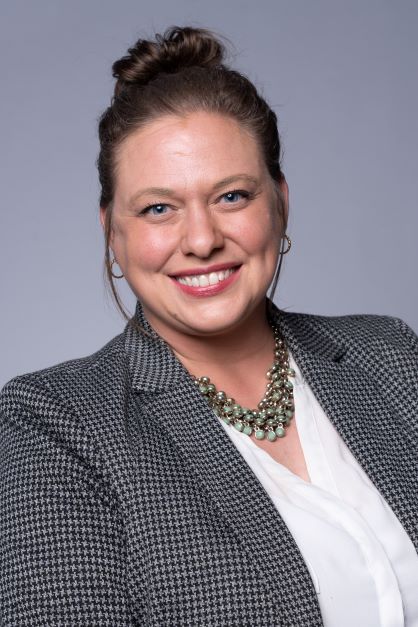Colleen Warner
Dr. Colleen Warner's research examines how communication shapes and sustains relationships in complex, diverse, and modern family structures and experiences. A major focus of her research is communication in adoptive families, examining how adoptive parents’ communication with and about birth families sustains adoptee well-being. Colleen also researches links between family communication and diverse social identities, such as religion and political identification. In this work, Colleen focuses on children’s communication experiences and abilities, with an aim to understand children’s unique perceptions of their family relationships.
Colleen takes an applied approach to scholarship by translating family communication research to families in the community. Colleen serves as a family communication educator, partnering with mental health professionals in Columbia to provide families with strategies for connecting and coping. Her research is solution-focused to provide families with communication processes to support relational health and personal well-being.
Colleen's work has been published in Communication Monographs, Communication Research, Sex Roles, Journal of Family Communication, and Adoption Quarterly in addition to regional and specialty journals. She has also presented her work and received top paper awards at a number of regional and national conferences. Colleen’s work has been supported with grants from the Organization for Research on Women and Communication as well as the University of Missouri (Research Board, Research Council, Arts and Science Alumni Organization Faculty Incentive Grant, and the Richard Wallace Alumni Fund). She was also the recipient of a University of Missouri College of Arts and Science fellowship in 2015. Colleen is on the editorial board of Journal of Family Communication, Western Journal of Communication, and Southern Communication Journal. Colleen is active in the family and interpersonal divisions of the National Communication Association.
Family diversity; Identity in family and personal relationships; Discourse dependence; Adoptive families; Interfaith families; Intergroup theorizing; Social identity difference; Children’s communication; Family communication training
COMMUN 4520 Family Communication
COMMUN 4701 Children’s Communication
COMMUN 9310 Seminar in Family Communication
Braithwaite, D., Schrodt, P., & Warner, C. (2024). Family communication: Cohesion and change (11th ed.). Routledge.
Colaner, C. W., Atkin, A. L., Elkhalid, A., Minniear, M., & Soliz, J. (2022). Communication in interfaith and multiethnic-racial families: Navigating identity and difference in family relationships. Journal of Social and Personal Relationships. 40(6), 1673-1705. https://doi.org/10.1177/02654075221137317
Ogan, M. A.*, Monk, J. K., Killoren, S., Rivero, A., Colaner, C. W., & Carlos Chavez, F. L. (2022). The effects of discrimination and psychological distress on U.S. Latino/a young adults’ relational uncertainty and relationship instability. Cultural Diversity and Ethnic Minority Psychology. Advance online publication. https://doi.org/10.1037/cdp0000567
Colaner, C. W. (2022). Adoption, communication, and family networks: Current research and future directions. Journal of Family Communication, 22(3), 185-192. https://doi.org/10.1080/15267431.2022.2101458
*Charvat, E. J., Garneau-Rosner, C. L., Monk, J. K., & Colaner, C. W. (2022). The intergenerational transmission of relationship instability: A focus on emerging adult on-off relationships. Family Process, 62(1), 423-441. https://doi.org/10.1111/famp.12765
Hernandez, R. & Colaner, C. W. (2022). “The stakes are so high and it’s happening so fast”: Parentification of adult children during the COVID-19 pandemic. Journal of Social and Personal Relationships, 39(7), 1959–1978. https://doi.org/10.1177/02654075221074380
Colaner, C. W., *Elkhalid, A., *Bish, A., *Butauski, M., *Nelson, L., & *Rick, J. (2021). Communicatively constructing godparenthood: Relational maintenance and relational closeness. Journal of Family Communication, 21(2), 107-117, https://doi.org/10.1080/15267431.2021.1903901
Colaner, C. W., *Bish, A., *Butaski, M., *Hays, A., Horstman, H., & Nelson, L. R. (2022). Communication privacy management in open adoption relationships: Negotiating co-ownership across in-person and mediated communication. Communication Research, 49(6), 816-837. https://doi.org/10.1177/0093650221998474
Hernandez, R. & Colaner, C. W. (2021). “This is not the hill to die on. Even if we literally could die on this hill”: Examining communication ecologies of COVID-19 uncertainty, family communication, and healthcare. American Behavioral Science, 65(7), 956-975. https://doi.org/10.1177/0002764221992840
McQuillan, J, Greil, A. L., Rybinska, A., Tiemeyer, S., Shreffler, K., & Colaner, C. W. (2021). Is a dyadic stressor experienced as equally distressing by both partners? The case of perceived fertility problems. Journal of Social and Personal Relationships, 38(1), 342-362. https://doi.org/10.1177/0265407520953903
Warner, B., Colaner, C. W., *Park, J. (2021). Political difference and polarization in the family: The role of (non)accommodating communication for navigating identity differences. Journal of Social and Personal Relationships, 38(2), 564-585. https://doi.org/10.1177/0265407520967438
*Nelson, L. R., & Colaner, C. W. (2020). Fostering “family”: Communication orientations in the foster parent-child relationship. Western Journal of Communication, 84(4), 476-498. https://doi.org/10.1080/10570314.2020.1734231
Soliz, J. & Colaner, C. W. (Eds.). (2020). Navigating relationships in the modern family: Communication, identity, and difference. Peter Lang.
